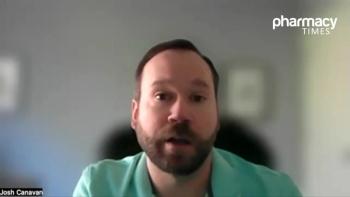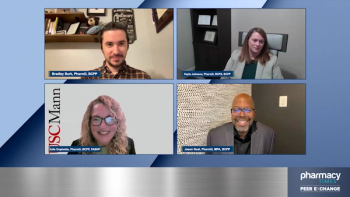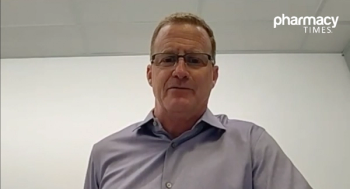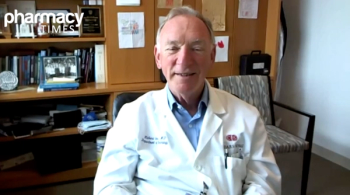
According to Pranav Garimella, pharmacists are essential in counseling patients with CKD on the appropriate use of semaglutide.

According to Pranav Garimella, pharmacists are essential in counseling patients with CKD on the appropriate use of semaglutide.

Gaps in education about biosimilars, particularly among pharmacists, patients, and prescribers, are a significant barrier to wider adoption.

Etranacogene dezaparvovec offers a long-term, cost-effective solution for hemophilia B by providing sustained factor IX expression but requires careful patient selection and post-infusion liver monitoring.

Panelists discuss how pharmacists must carefully consider factors like age-related changes in drug metabolism, comorbid conditions, concurrent medications, fall risk, and individual patient response when dosing and titrating VMAT2 inhibitors in older adults, typically recommending a "start low, go slow" approach while closely monitoring for both efficacy and adverse effects.

Panelists discuss how pharmacists serve as essential medication experts by providing comprehensive counseling on VMAT2 inhibitors, including proper administration, expectations for symptom improvement, potential side effects, and drug interactions, while playing a vital role in monitoring older adult patients through regular check-ins, medication therapy management services, and collaboration with the healthcare team to optimize treatment outcomes.

Melody Smith, MD, MS, discusses how microbiome modulation may influence CAR T-cell therapy toxicity and outcomes, highlighting potential future interventions and clinical integration challenges.

Melody Smith, MD, MS, discusses how the intestinal microbiome influences CAR T-cell therapy outcomes, highlighting the negative impact of certain antibiotics and the potential role of dietary interventions in improving treatment efficacy.

Semaglutide has been approved for reducing kidney disease progression and cardiovascular risk in patients with type 2 diabetes, marking a significant advancement in CKD management.

Panelists discuss how menopause represents a complex physiological transition characterized by hormonal fluctuations, reproductive system changes, and multifaceted symptoms affecting physical, psychological, and metabolic health. Comprehensive patient education, personalized management strategies, and holistic support are crucial for navigating this transformative life stage.

Panelists discuss how antibody-drug conjugates (ADCs) combine monoclonal antibodies with cytotoxic payloads, enabling precise targeting of breast cancer (BC) cells through specific antigen recognition. Upon binding, the ADC-antigen complex is internalized, releasing the toxic payload inside cancer cells while largely sparing healthy tissue. This targeted approach offers improved efficacy and reduces systemic toxicity compared with traditional chemotherapy's broad cytotoxic effects.

Panelists discuss how the National Comprehensive Cancer Network (NCCN) and American Society of Clinical Oncology (ASCO)/College of American Pathologists (CAP) guidelines for HER2-negative breast cancer (BC) have evolved to recognize HER2-low (IHC 1+ or 2+/ISH-negative) and HER2-ultra low (IHC 0) as distinct categories. These classifications, particularly HER2-low, guide eligibility for targeted therapies such as trastuzumab deruxtecan, expanding treatment options beyond traditional chemotherapy for previously categorized HER2-negative patients.

Panelists discuss how pharmacists play a crucial role in optimizing health outcomes for women with complex health needs through comprehensive medication management, personalized consultations, and interdisciplinary collaboration. They provide targeted medication therapy, monitor drug interactions, offer medication counseling, manage chronic conditions, support reproductive health, and help patients navigate complex treatment regimens with expertise and compassionate care.

Identifying and managing IVIG-related side effects early on in treatment can improve efficacy and safety for patients with CIDP.

Phil Vigeant shares insights on the health benefits of protein supplements and guidance for consumers to identify safe and effective protein powder products.

Donna Ryan explains why long-term treatment with GLP-1 medication is typically necessary to maintain weight loss benefits.

Future research can explore the underlying cause of recurrent pericarditis with systemic Sjögren syndrome and the combination of rilonacept with immunosuppressive therapies.

Steven Pipe, MD, explains the long-term efficacy data surrounding etranacogene dezaparvovec in patients with hemophilia B.

Panelists discuss how the TD patient journey often begins with subtle symptoms that may go unrecognized, particularly in older adults who face unique challenges with diagnosis and treatment, while emphasizing the crucial role pharmacists play in early identification through medication reviews, regular monitoring of patients on antipsychotics, coordination with healthcare providers, and ongoing assessment of treatment response and adherence.

Panelists discuss how barriers to optimizing TD therapy include insurance coverage limitations, high medication costs, delayed diagnosis, lack of provider awareness, and stigma associated with movement disorders, while highlighting strategies like patient assistance programs, early screening protocols, provider education initiatives, and collaborative care models to overcome these obstacles and improve access to effective treatment.

Pharmacists can help educate patients, identify adverse events, and help patients communicate with other health care professionals or drug companies.

Andrew Lin, PharmD, BCOP, discusses his pharmacist-led study examining the association between early tacrolimus levels and outcomes post-allogeneic hematopoietic cell transplantation.

Panelists discuss how health care professionals collaborate through interdisciplinary teams, integrated care coordination, and life cycle-specific approaches to provide comprehensive women’s health care, addressing gaps by implementing patient-centered, culturally sensitive models that prioritize holistic well-being across different life stages.

Panelists discuss how menopause marks a significant life transition, characterized by hormonal decline, reproduction cessation, and unique physiological changes requiring medical and emotional support. Health care professionals guide women through life’s reproductive stages, providing comprehensive health care from menarche to post menopause, focusing on individualized prevention of symptom management, and holistic well-being across hormonal transitions.

Panelists discuss how menopause marks a significant life transition, characterized by hormonal decline, reproduction cessation, and unique physiological changes requiring medical and emotional support. Health care professionals guide women through life’s reproductive stages, providing comprehensive health care from menarche to postmenopause, focusing on individualized prevention of symptom management and holistic well-being across hormonal transitions.

Molly Schiffer, PharmD, BCOP, discusses the logistical, operational, and financial challenges of delivering cellular therapies in the outpatient setting, focusing on CAR T-cell therapy, TIL therapies, and emerging trends in non-oncology applications.

Richard Lewis discusses the critical role pharmacists and health care providers play in ensuring safe administration of IVIG for patients with CIDP.

Pharmacists should educate patients on abelacimab's potential therapeutic impact on atrial fibrillation patients at risk of stroke.

Zahra Mahmoudjafari, PharmD, BCOP, FHOPA, discusses the logistical challenges and interprofessional strategies essential for delivering cellular therapies in outpatient settings, emphasizing the pharmacist's role in improving patient outcomes and addressing health disparities.

Proper nutrition and awareness of potential side effects from GLP-1 medications are essential for patients undergoing treatment.

Panelists discuss how TD treatment can be optimized through individualized approaches that consider patient-specific factors like symptom severity, comorbidities, concurrent medications, and daily routines, utilizing tools like titration kits to carefully adjust VMAT2 inhibitor dosing while monitoring response and tolerability to achieve the best possible outcomes for each patient.